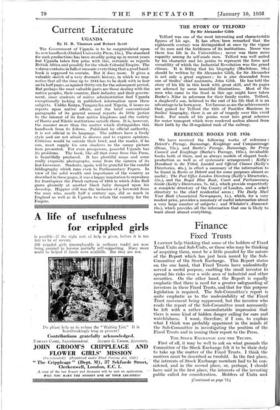UGANDA
Current Literature
By H. B. Thomas and Robert Scott The Government of Uganda is to be congratulated upon its new handbook (Oxford University Press, 15s.). The standard for such productions has been steadily going Up in recent years but Uganda takes first prize with this, certainly as regards British Africa and possibly for the whole Colonial Empire. The volume contains in fullest measure everything that a good hand- book is supposed to contain. But it does more. It gives a valuable sketch of a very dramatic history, in which we may notice that all the time up to 1844 has to be dealt with in four ands half pages, as against thirty-six for the subsequent period. But perhaps the most valuable parts are those dealing with the native peoples, their country, their industry and their govern- ment, since students of native administration find Uganda exceptionally lacking in published information upon these subjects. Unlike Kenya, Tanganyika and Nigeria, it issues no reports upon native affairs, and the brief conventional paragraphs of its general annual reports do little justice to the interest of its four native kingdoms and the variety of Bantu and Nilotic institutions outside them. It is, however, the manner more than the matter which distinguishes this handbook from its fellows. Published by official authority, it is not official in its language. The authors have a lively style and are not afraid to discuss and to express opinions. Criticism would be outside their brief, and the reader, if he can, must supply his own shadows to the sunny picture here presented. For even prosperous, peaceful Uganda has its problems. The book, like all that come from this Press, is beautifully produced. It has plentiful maps and some really exquisite photographs, some from the camera of its -last Governor. Students, again, will be grateful for the careful
• .bibliography which runs even to Parliamentary Papers. In view of the solid wealth and importance of the country as described in these pages, it was a happy inspiration to reproduce for frontispiece the Punch cartoon of 1894 in which John Bull gazes gloomily at another black baby dumped upon his doorstep. Happier still was the inclusion of a foreword from the man who, nearly half a century ago, did so much in England as well as in Uganda to retain the country for the Empire.










































 Previous page
Previous page